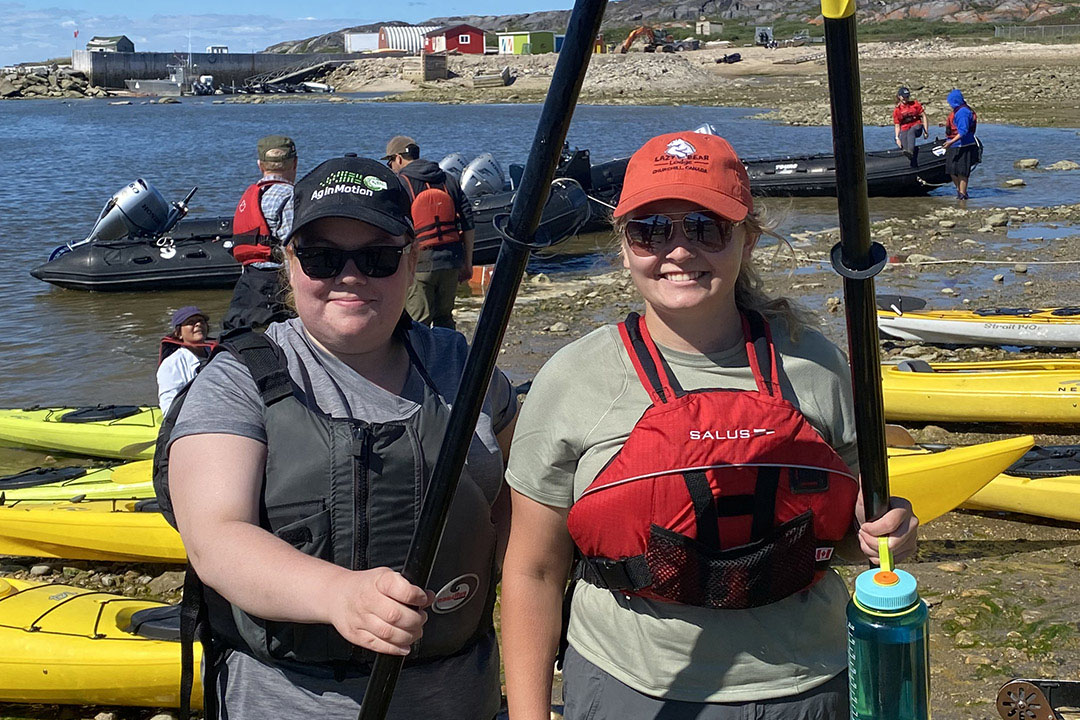
USask AgBio student explores wildlife research in the north
Kira Mudrey was honoured for her academic achievement during the Indigenous Student Achievement Awards Ceremony on March 9.
By Brett MakulowichMudrey is studying animal bioscience in the College of Agriculture and Bioresources (AgBio) at the University of Saskatchewan (USask). She is a member of Métis Nation-Saskatchewan.
“Receiving this Indigenous Academic Achievement Award is a culmination of all the work I have put in over the last four years,” said Mudrey. “During my time in university, I have worked harder than I could have believed, and it feels incredibly special to have my work recognized at such a high level. Having the award presented by Elders made the ceremony feel deeply personal.”

Mudrey is set to graduate this spring with her Bachelor of Science in Animal Bioscience and plans to pursue a graduate degree in veterinary microbiology in the fall. For Mudrey, helping animals is a lifelong passion.
“As a young child, our veterinarian seemed to be this amazing, magical person that could make my sick puppy feel better. As I got older, my fascination with animal health never went away and I decided to pursue animal bioscience.”
“I chose to attend the College of Agriculture and Bioresources for my animal bioscience degree because of the college’s excellent reputation and the opportunities for hands-on learning with animals. I have always found my AgBio classes to be the most engaging.”
Since starting university, she has discovered a love for field work and research along with an interest in microbiology and diagnostics for disease. Her favourite class, ANBI 475.3 Field Studies in Arctic Ecosystems and Indigenous Peoples, taught by Dr. Ryan Brook (PhD), was held in Churchill, Man., in August 2022.
The two-week field research course features hands-on learning experiences and research data collection in sub-arctic ecosystems. The course led Mudrey to write her undergraduate thesis on wildlife research, Ecology and Management of Barren Ground Grizzly Bears (Ursus arctos) in Northern Canada.
The students also kayaked with beluga whales, swam in Hudson’s Bay, and took helicopter rides along the coast to see polar bears.
“One experience that stands out as being particularly meaningful during the course was listening to a talk from two Cree trappers in Churchill,” said Mudrey. “They discussed the importance of trapping to Indigenous peoples in the area and told us all about different trapping methods, methods of preparing fur, and the importance of trapping as a way to maintain their connection to the land.”
“Growing up in the city, trapping is an aspect of Indigenous culture I didn’t know much about, so it was a special experience to learn all about it from someone who is so connected to the land and to their culture.”
Mudrey grew up in Saskatoon and has ancestral connections to Batoche, Sask. Her connection to Batoche inspired her to take a Parks Canada summer job as a bilingual interpreter at the Batoche National Historic Site.
“My job as an interpreter is primarily to give tours of the site and our historical buildings (St. Antoine de Padoue church, the rectory, and the Caron farmhouse). We present the history of the community of Batoche, talk about the battle that took place in 1884, and discuss Métis culture.
“I was drawn to the position because I am a Métis person. I wanted a chance to learn more about myself and my history, as well as share the history and culture of Métis people with others.”
As she concludes her final term of undergraduate studies at USask, Mudrey is reflective:
“During my time at USask, I learned I have a passion for the outdoors and for wildlife conservation research. Some of this stems from my work with Parks Canada, but a lot of it is from my experiences in animal science courses.”
With a graduate degree in veterinary microbiology on the horizon and a dedication to academic achievement, the future is bright for Mudrey.

